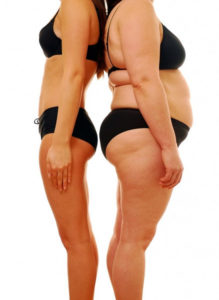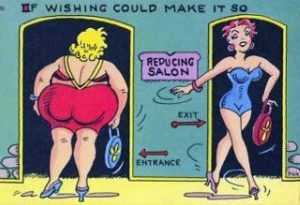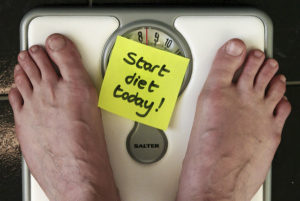Body Weight Set-Point
 Your body weight set-point is the weight that your body automatically tries to maintain. If you get sick with the flu and lose some weight you’ll typically bounce right back to your normal weight once you are well. There are even studies that show forced overfeeding of normally healthy people causes weight gain but when those same people drop from “overfeeding” back to “normal feeding” their body bounces back down to what was their normal weight (1, 2).
Your body weight set-point is the weight that your body automatically tries to maintain. If you get sick with the flu and lose some weight you’ll typically bounce right back to your normal weight once you are well. There are even studies that show forced overfeeding of normally healthy people causes weight gain but when those same people drop from “overfeeding” back to “normal feeding” their body bounces back down to what was their normal weight (1, 2).
The big question, why is there obesity if we all have a body weight set-point? Good question. While the body weight set-point is pretty stable, it can change and that change is gradual. Weight gain also tends to be gradual, 1-2 lbs/year. 1-2 lbs. is easy to over look but not after 10 years when 1-2 lbs. is now 10-20 lbs. This gradual change in body weight has also re-set the body set-point weight to 10-20 lbs. more than it was.
Lets say your average body weight during what you would consider your “prime” was 150 lbs. It’s now 10 years later and each year 1-2 lbs. has snuck up on you. You now weight 170 lbs. You decide you’re going to get back to that “normal” weight of your “prime”. You diet. You cut your calories and increase your exercise. Success! You lost the 20 lbs. It wasn’t easy, you were tired and you were hungry (and probably irritable and no fun to be around) but you did it. You’re finally back to what you think is your optimal weight and ready to ditch the diet and get back to normal life. Unfortunately there’s a problem. You and your body disagree about what your “optimal” weight is. You think it’s 150 lbs. but your body thinks it’s 170 lbs. Guess what, your body is a force to be reckoned with.
Weight Loss Resistance
You want to lose weight, your body doesn’t (3). Toward that end, your body is going to institute metabolic change to make sure it can get you back to your set-point weight. Ghrelin, the hormone that tells you that you’re hungry increases. You feel hungry – the body is telling you to EAT. Leptin and other hormones that signal satiety and a feeling of fullness are reduced, so you don’t feel full or satisfied even after you eat. While all these hormones are encouraging you to eat more your metabolism is slowing down causing normal body function to slow in an effort to burn less calories and conserve energy. This will make you feel tired and lethargic so you move less allowing the body to conserve all the calories (energy) you’re eating and gain weight to get you back to your set-point. Now, you can hold out for a while, watch what you eat, force yourself to go to the gym but eventually you will give in. Willpower is NOT a sustainable way to lose or maintain weight.
I realize I’m not painting a pretty picture. Unfortunately there’s more bad news. Losing the weight is actually the easy part. Well, easy compared to maintaining that weight loss. You lost the 20 lbs. but your body is annoyingly persistent and it’s going to continue to scream at you to eat more and move less until it gets you back to your body weight set-point. Like I said earlier, you can fight this hormonal barrage for a while but nature is amazing and the majority of us won’t be able to hold out. When you finally give in and go back to your normal eating pattern it will actually take less food/calories for you to put on weight than it did before your low-calorie diet. Why? Because your body is burning less calories at rest. Weight gain is easier and faster. Your body wants that 20 lbs. back no mater what you have to say about it.
Lasting Weight Loss Is Possible
 O.k., hopefully you now understand what body weight set-point is. The weight your body is going to fight to maintain either from weight loss or forced (rapid) weight gain. Good news, weight can be lost and body weight set-point can be decreased for lasting weight loss. In my next post I’m going to explain the hormonal component of body weight set-point and begin the discussion about how we can change it. You didn’t think I was going to leave you without any hope did you?!?! Trust me, it’s all good. Look for my next post Monday.
O.k., hopefully you now understand what body weight set-point is. The weight your body is going to fight to maintain either from weight loss or forced (rapid) weight gain. Good news, weight can be lost and body weight set-point can be decreased for lasting weight loss. In my next post I’m going to explain the hormonal component of body weight set-point and begin the discussion about how we can change it. You didn’t think I was going to leave you without any hope did you?!?! Trust me, it’s all good. Look for my next post Monday.
Eat well, feel good, have fun.
Part 1 – Weight Gain, is it Calories or is it Hormones
Part 3 – Insulin, your Key to Weight Loss
part 4 – The Problem with High Fasting Insulin
Part 5 – Macronutrients and Weight Loss
Part 6 – Not Enough Fat, Too Many Carbs
Part 7 – It’s the type of Calories that Count
References:
- Sims EA. Experimental obesity in man. J Clin Invest. 1971 May; 50(5):1005-11.
- Sims EA et al. Endocrine and metabolic effects of experimental obesity in man. Recent Prog Horm Res. 1973; 29:457-96.
- Keesey R, Corbett S. Metabolic defense of the body weight set-point. Res Publ Assoc Res Nerv Ment Dis. 1984; 62:87-96.

I’m Amy a board certified holistic nutritionist, certified functional nutritionist and lifestyle practitioner and certified Life Coach. I help women in midlife understand the changing needs of their body so that they can stop dieting and lose weight permanently. At 56 I live what I teach. Don’t believe the story that your best years are behind you. They are not. Your best years are just starting!

